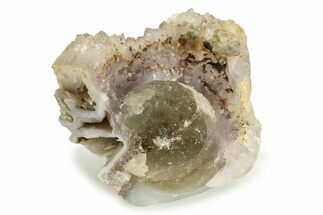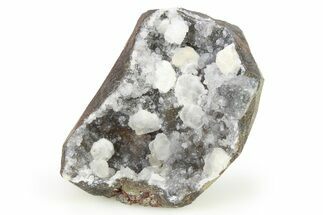This Specimen has been sold.
4.4" Spectacular Botryoidal Fluorite "Spheres" on Amethyst - India
This is a top-quality, unique formation of two yellow-green fluorite "spheres", collected from Madhya Pradesh, India. They formed in botryoidal fashion over a bed of amethyst crystals and chalcedony.
Comes with an acrylic display stand.
Under shortwave ultraviolet light, the fluorite exhibits a purple-white fluorescence.
Comes with an acrylic display stand.
Under shortwave ultraviolet light, the fluorite exhibits a purple-white fluorescence.
About Fluorite
Fluorite is a halide mineral comprised of calcium and fluorine, CaF2. The word fluorite is from the Latin fluo-, which means "to flow". In 1852 fluorite gave its name to the phenomenon known as fluorescence, or the property of fluorite to glow a different color depending upon the bandwidth of the ultraviolet light it is exposed to. Fluorite occurs commonly in cubic, octahedral, and dodecahedral crystals in many different colors. These colors range from colorless and completely transparent to yellow, green, blue, purple, pink, or black. Purples and greens tend to be the most common colors seen, and colorless, pink, and black are the rarest.
Fluorite is a halide mineral comprised of calcium and fluorine, CaF2. The word fluorite is from the Latin fluo-, which means "to flow". In 1852 fluorite gave its name to the phenomenon known as fluorescence, or the property of fluorite to glow a different color depending upon the bandwidth of the ultraviolet light it is exposed to. Fluorite occurs commonly in cubic, octahedral, and dodecahedral crystals in many different colors. These colors range from colorless and completely transparent to yellow, green, blue, purple, pink, or black. Purples and greens tend to be the most common colors seen, and colorless, pink, and black are the rarest.
Amethyst is a purple variety of quartz (SiO2) that owes its violet color to natural gamma irradiation, iron impurities, and the presence of trace elements, which result in complex crystal lattice substitutions. It is considered a semi-precious gemstone, and just two centuries ago was considered to have a value on par with diamonds, sapphires, and rubies. The largest and best known amethyst deposits occur in southern Brazil and Uruguay, where they are found in hydrothermally-formed geodes, but many localities around the world produce an amazing variety of amethyst crystals and formations. They are almost always formed in medium- to high-temperature geological settings.
SPECIES
Fluorite, Quartz var. Chalcedony & Quartz var. Amethyst
LOCATION
Madhya Pradesh, India
SIZE
Entire specimen: 4.4 x 3.1", Largest Fluorite: 1.6" wide
CATEGORY
ITEM
#305996
 Reviews
Reviews













